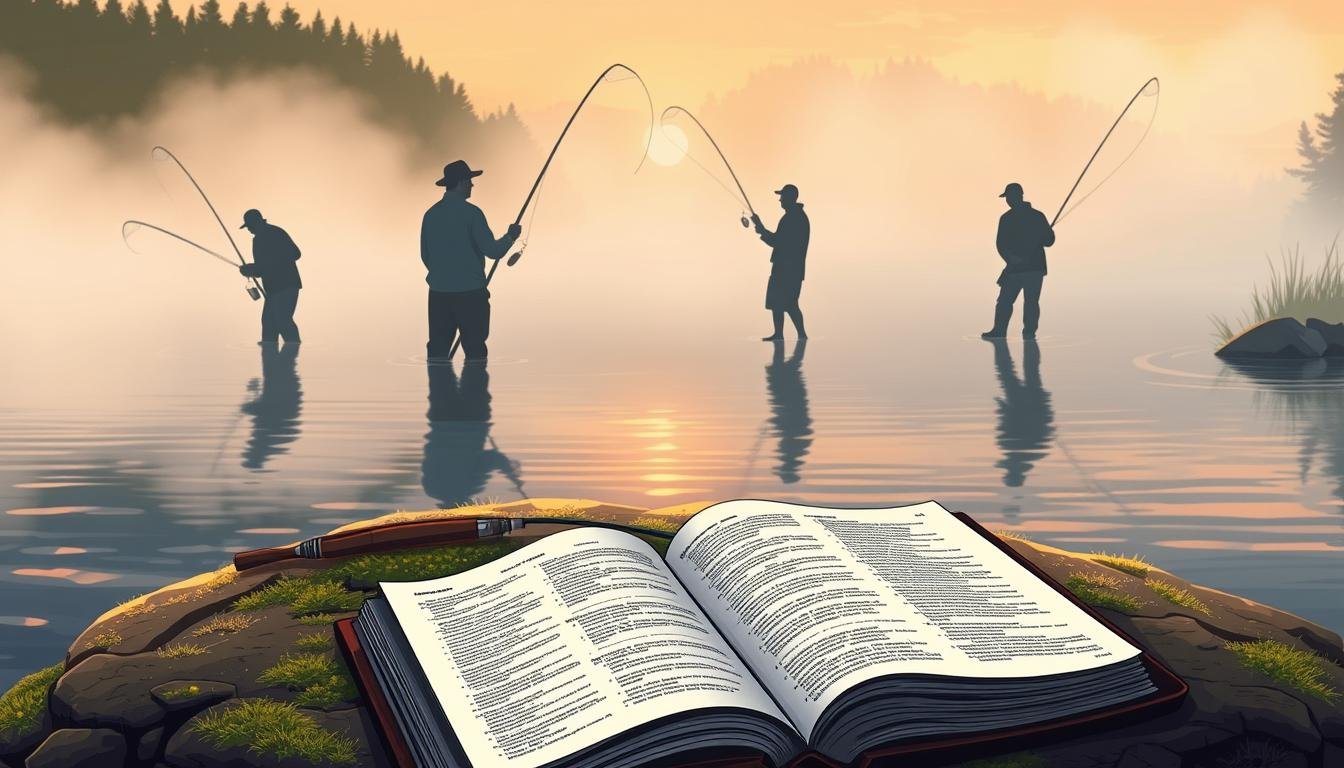Imagine standing on the shores of Galilee, nets heavy with fish. Then, Jesus says, “Follow me.” For the first disciples, this was a big change from just fishing to finding salvation.
The Bible talks about fishing in a special way. It’s not just about fishing. It’s about finding spiritual truths. Think about the 153 fish in John 21:11 or the nets breaking in Luke 5:4-6.
Scripture uses fishing to talk about provision, calling, and change. It shows God’s faithfulness in stories like feeding 5,000 with loaves and fish. Or when Jesus says, “I will make you fishers of men” (Matthew 4:19).
This shows how fishing in the Bible is connected to eternal truths. It’s not just about fishing. It’s about our spiritual journey.
Looking at the linen nets of Galilee or the healed waters of Ezekiel 47, we see a connection. Every reference in the Bible, like the tax coin in Matthew 17:27 or the parable of the dragnet in Matthew 13, invites us to look deeper. The sea and nets are symbols for our spiritual journey, judgment, and eternal life.
Let’s explore the deep meanings of fishing in the Bible’s stories together.
The Ancient Art of Fishing in Biblical Times
Fishing in biblical times was very important in Galilean society. It helped communities survive and shaped their culture. The “Jesus Boat” found in 1986 shows the skill of these fishermen.
Over 2,000 fishing boats were in the area during Jesus’ time. This shows how big the fishing industry was.
“When Simon Peter saw the catch, he fell at Jesus’ knees, saying, ‘Depart from me, for I am a sinful man, O Lord!’ (Luke 5:8-9, ESV)
Fishing as a Primary Occupation in Galilee
The Sea of Galilee had many fish like sardines and musht fish. Families needed fishing to survive. Men worked from spring to autumn.
Galilee’s location helped its economy. Sea of Galilee fishing was key for trade.
Fishing Equipment and Techniques Used in Jesus’s Time
Fishermen used cast nets and trammel nets. They also had hooks and spears. The “Jesus Boat” was a strong vessel for storms.
These methods needed skill and teamwork. They were hard work.
The Economic Importance of the Fishing Industry in Biblical Israel
Fishing helped pay for temple taxes and supported trade. Fish were preserved for trade. Tax records show fishing families paid based on their catch.
This explains why Jesus chose fishermen. They were used to hard work and risk. (Mark 1:17). ESV).
Key Bible Verses About Fishing and Their Historical Context
Matthew 4:19 is key. Jesus calls Simon and Andrew to be “fishers of men.” This shows life in first-century Galilee, where fishing was important.
Archaeology shows over 230 boats in the Sea of Galilee back then. This highlights its role in society. Luke 5:1-11 talks about a big catch. It shows the challenges fishermen faced, like fishing at night and following strict food laws.
Boats were 23 feet long and had five crew members. They could carry up to half a ton of fish.
John 21:11 tells of catching 153 fish without harming the net. This number means completeness in Jewish numerology. A ban on fishing in Galilee in 2010 shows ancient challenges.
In 1986, a 1st-century fishing boat was found. It matches what the Bible says about nets. Fishermen like Peter and James made fish sauce to sell.
These fishing bible verses are richer when we understand their context. Matthew 13:47-50 compares the kingdom of heaven to a net catching all kinds of fish. This shows how Jesus’ teachings were relatable to his listeners.
The Calling of the First Disciples: Fishers of Men
When Jesus met Simon Peter and Andrew by the Sea of Galilee, He changed their lives. “Follow me,” He said, “and I will make you fishers of men.” This call made them start a new journey, one filled with spiritual purpose.
The term “fishers of men” (Greek: piscatores anthropōn) means to bring people to God’s kingdom. It’s a key part of being a disciple.
“Follow Me, and I will make you fishers of men.”
Matthew 4:19 – “Follow Me, and I Will Make You Fishers of Men”
This verse is a big change for Peter and Andrew. The Greek word kaleō means God is calling them. “Fishers of men” (Matthew 4:19 meaning) shows they will use their skills to help others.
Jesus told them to “follow” Him. They left their nets right away. James and John also left their boat, showing they fully followed Christ.
The Transformation from Literal to Spiritual Fishing
For the disciples fishing, catching souls became their new job. Their nets used to catch fish. Now, they catch people for God.
The New Testament shows this change in Acts 4:12. Peter’s old job is now a symbol for spreading the word of God.
What Jesus Meant by This Powerful Metaphor
Jesus’ words remind us of Jeremiah 16:16. It talks about God using “fishermen” to gather His people. The word anthropoi (humankind) means everyone can be saved.
This call means disciples must give up their own plans. They must follow Christ’s plan. Today, we learn that being a disciple means serving Christ, not just ourselves.
Miraculous Catches and Divine Intervention in Scripture
The miraculous catch of fish in Luke 5:1-11 and John 21:1-14 is key. It shows Jesus’ power and His call to His followers. In Luke, the nets were full and the boats were almost sunk. This shows we can’t do it alone.
“When the Holy Spirit came upon the disciples in Acts 2, there was another miraculous catch of fish—three thousand souls saved, not by skill but divine power,” as Peter’s obedience transformed despair into divine provision.
“Cast the net on the right side of the boat, and you will find a catch.” (John 21:6, NIV)
In Luke, the Jesus fishing miracle happens early. It shows Peter’s change from fisherman to apostle. The nets were full, showing God’s power.
John’s story, after Jesus’ death, shows 153 fish and full nets. It’s about fellowship and a new mission. Both stories are about divine intervention fishing in both the physical and spiritual worlds.

These stories mix the natural and spiritual. Luke talks about calling to ministry. John shows Jesus’ identity after his death. The 153 fish in John are mysterious but show God’s care.
Acts 2’s 3,000 conversions are like the miraculous catch of fish. They show that following God’s plan brings more than we can do.
The divine intervention fishing story is more than fishing. It teaches us to trust God’s timing. Peter fished all night but caught nothing until Jesus told him to try again.
These stories teach us about faith. They show that when we can’t do it, God can. They remind us that God’s gifts are endless, even when we have little.
Fishing as a Metaphor for Spiritual Harvesting
Scripture uses fishing metaphors to show God’s plan to gather His people. This plan involves both divine and human efforts. It shows a cosmic harvest where believers help gather souls, trusting in God’s plan.
Jeremiah 16:16 and God’s Promise to “Send for Many Fishermen”
“I will send for many fishermen, declares the Lord, and they shall fish them up from all nations.”
This prophecy looks forward to Jesus’ call in Matthew 4:19. It turns Jeremiah’s words into a call to spread the gospel. It shows God’s role and our duty in spiritual harvesting, just like Acts 1:8 promises.
Early Christians saw this as a divine command. Paul uses “harvest” language in 1 Corinthians 9:11, showing its importance.
The Parable of the Net in Matthew 13:47-50
Jesus’ parable of the net shows the kingdom’s nature. It says, “They gathered every kind of fish” (Matthew 13:48). ESV). The net gathers all but then separates, showing God’s all-encompassing plan.
Believers work hard, knowing God will judge in the end. This is like farmers waiting for harvest (Galatians 6:9).
Separating the Good from the Bad: Judgment Symbolism
The parable’s end shows the importance of final judgment. It’s like fishermen sorting fish, with some going to containers and others to fire. This mirrors God’s judgment (Matthew 25:32-33), showing the end of spiritual harvesting.
This judgment is like the wheat and tares parable. Growth happens with judgment hidden.
Today, Christians follow this mission. They keep reaching out (like Luke 5:5-6), work together (Ecclesiastes 4:9-12), and stay faithful to the harvest promise. The parable of the net encourages us to work now, trusting God will sort everything at Christ’s return.
Peter’s Journey: From Fisherman to Fisher of Men
Simon Peter was a fisherman from Galilee. He knew the Sea of Galilee well. His skills helped Jesus call him.
Jesus changed Peter’s life. He turned his nets into tools for spreading the word. Doubt turned into faith.

The Significance of Peter’s Fishing Background
Peter worked with his brothers in fishing. Their lives were ruled by the sea. The Gospels show how Jesus changed him.
Peter was skeptical at first. But Jesus made him see the abundance. This was the start of his new path.
The way fishing crews worked together showed early church life. It showed how Christ uses our skills for His service.
The Coin in the Fish’s Mouth (Matthew 17:24-27)
“From whom do the kings of the earth collect customs and taxes? From their sons or from others?” (Matthew 17:25)
This story shows Peter’s growing trust in God. Jesus asked him to get a coin from a fish. It showed God’s control over money.
This miracle showed Peter’s new role. It linked his fishing skills to managing money. It showed his work was now under God’s plan.
Peter’s Post-Resurrection Fishing Experience in John 21
After denying Jesus, Peter went back to fishing. But this time, Jesus was there. He made a big catch, just like before.
When Peter followed Jesus’ command, he caught even more fish. This was a sign of his new mission. Jesus told him to take care of His sheep.
This moment was the peak of Peter’s transformation. His fishing skills were now for spreading the word. The 153 fish and the charcoal fire showed his new start.
Feeding the Multitudes: Fish as Spiritual Sustenance
The loaves and fishes miracles show Christ’s power over nature and human needs. These stories of feeding the multitudes use fish to show God’s care. Early Christians used the Ichthys emblem to symbolize this.
Jesus made five loaves and two fish feed 5,000 men. There were leftovers for twelve baskets. This mirrors Israel’s twelve tribes and Christ’s mission.
Jesus fed 4,000 with seven loaves and fish, leaving seven baskets. This shows God’s perfection. After rising, Jesus made breakfast with fish, linking food to spiritual nourishment.
The leftovers, twelve and seven baskets, show God’s abundance. This is like the manna in Exodus 16:4-5.
“I am the bread of life,” said Jesus, linking His body and blood to the Eucharist (John 6:35). For deeper study, explore fish symbolism in early Christian worship.
Early believers saw fish as more than food for the body. The seven and twelve baskets show God’s faithfulness. Today, we see Christ’s ongoing care in sacramental bread and wine.
For analysis of eucharistic overtones, note how Jesus’ actions foreshadow the Last Supper’s elements.
These stories urge us to trust in God’s provision, even when we have little. Just as fish multiplied to feed people, Christ’s word satisfies our spiritual hunger. The post-resurrection meal (John 21:13) shows the Church’s mission to share God’s care through mercy.
Modern Interpretations of Biblical Fishing Stories
Biblical fishing stories are full of spiritual wisdom. They help us face faith’s challenges today. Biblical stewardship teaches us about missional work, just like fishing teaches patience and trust.
How Churches Use Fishing Metaphors Today
Churches see outreach as “fishing for souls.” They teach that never giving up is key. They run “fishing evangelism” programs, just like Jesus did.
These programs teach us to keep trying, even when it seems hard. They remind us of Jeremiah 16:16, where God’s “fishermen” seek out lost souls.
Fishing Imagery in Christian Art
Christian art uses symbols like the ichthys (fish) to show faith. Medieval art shows apostles reaching out to people, symbolizing spreading the word. Today, artists mix old and new, showing the importance of reaching out.
The fisherman’s net is a symbol of welcoming everyone. It reminds us of Matthew 13:47-50, where Jesus talks about judgment and salvation.
Applied Lessons for Contemporary Believers
Today’s believers learn from Peter’s story after Jesus’ resurrection. It teaches us to focus on deep relationships, not just numbers. D.A. Carson says we should commit to our faith every day, just like fishermen do.
Like Irish fishermen dealing with the Russian navy, we must be smart and faithful. These stories teach us to be wise and caring in our faith.
FAQ
What is the significance of fishing in the Bible?
Fishing in the Bible is more than a job. It’s a symbol for spiritual growth, God’s care, and spreading the word of Jesus. It shows how we can bring people to God’s kingdom.
Why did Jesus choose fishermen as His first disciples?
Jesus picked fishermen first to show how their skills could change. It was a way to teach them about helping others find the Kingdom.
What fishing techniques were commonly used in Biblical times?
Fishermen in the Bible used nets and lines to catch fish. These methods helped them make a living and were important for Jesus’ disciples.
How does the metaphor of "fishers of men" relate to evangelism?
The “fishers of men” metaphor shows the disciples’ new mission. It’s about moving from physical work to sharing the gospel with others.
What are some miraculous fishing accounts in Scripture?
The Bible tells of amazing fishing stories, like in Luke 5:1-11 and John 21:1-14. These stories show Jesus’ power and teach us about following Him.
How does fishing imagery convey themes of judgment in the Bible?
Fishing images, like in Matthew 13:47-50, talk about God’s judgment. They show how God separates the good from the bad, inviting all to follow Him.
In what ways does Peter’s story embody the journey of discipleship?
Peter’s story shows how to become a follower of Jesus. His journey, from fisherman to apostle, teaches us about Jesus’ power to change lives.
What role does fish play in the feeding miracles of Jesus?
Fish in the Bible means God’s care and spiritual food. The miracles, like feeding 5,000, show Jesus’ power to meet our needs and feed our souls.
How have biblical fishing stories been interpreted in modern Christian practice?
Today, we use fishing stories in many ways. They’re in sermons, teaching, and art. These stories help us understand our faith and share it with others.

Rockin’ the faith, one verse at a time!
Growing up, the Bible’s stories deeply impacted me. Now, with over 15 years of preaching experience, I blend timeless teachings with modern technology, making them relevant for today’s world.
Bible Hub Verse is my platform to share historical insights and thought-provoking articles, exploring both familiar and uncommon Christian topics. My passion is building a welcoming online space for everyone to learn, grow in their faith, and discover the Bible’s enduring message.
Join the journey!
God bless you.









